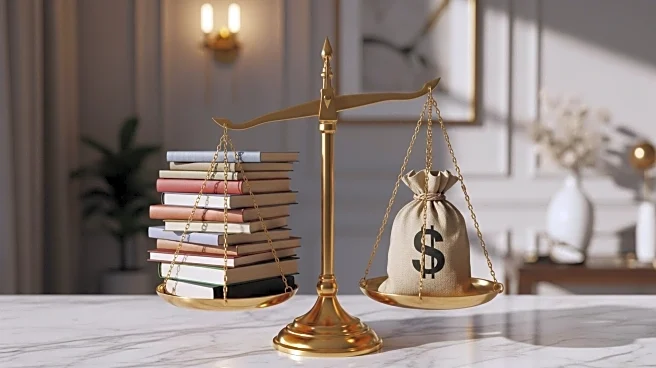What's Happening?
Anthropic has reached a $1.5 billion settlement in a class action lawsuit brought by a group of authors. This settlement, the largest in U.S. copyright law history, will provide at least $3,000 to around half a million writers. The lawsuit, Bartz v. Anthropic, was filed due to Anthropic's use of copyrighted material to train its AI models, including pirated books from shadow libraries. Federal judge William Alsup ruled that training AI on copyrighted material is legal under the fair use doctrine, which has not been updated since 1976. The settlement resolves the piracy issue, not the legality of AI training, as Anthropic continues to develop AI systems.
Why It's Important?
The settlement highlights the ongoing tension between tech companies and creative industries over the use of copyrighted material for AI training. While writers receive compensation, the ruling supports tech companies' ability to use copyrighted works under fair use, potentially affecting the future of copyright law. This decision may influence other lawsuits against companies like Meta, Google, and OpenAI, shaping the legal landscape for AI development. The outcome could impact the creative industry, as AI models trained on copyrighted material may alter the demand for original content.
What's Next?
As the settlement resolves piracy claims, other cases regarding AI and copyrighted works are expected to proceed in court. Judges may reference Bartz v. Anthropic as a precedent, but future rulings could differ based on the specifics of each case. The legal community and creative industries will closely monitor these developments, as they may lead to changes in copyright law and AI training practices. Anthropic's commitment to developing safe AI systems suggests ongoing efforts to balance innovation with legal and ethical considerations.
Beyond the Headlines
The settlement raises ethical questions about the use of copyrighted material in AI training. It challenges the balance between technological advancement and the protection of intellectual property rights. The decision may prompt discussions on updating copyright laws to address modern technological challenges. Additionally, the case underscores the need for transparency and accountability in AI development, as companies navigate the complexities of using existing works to create new technologies.









